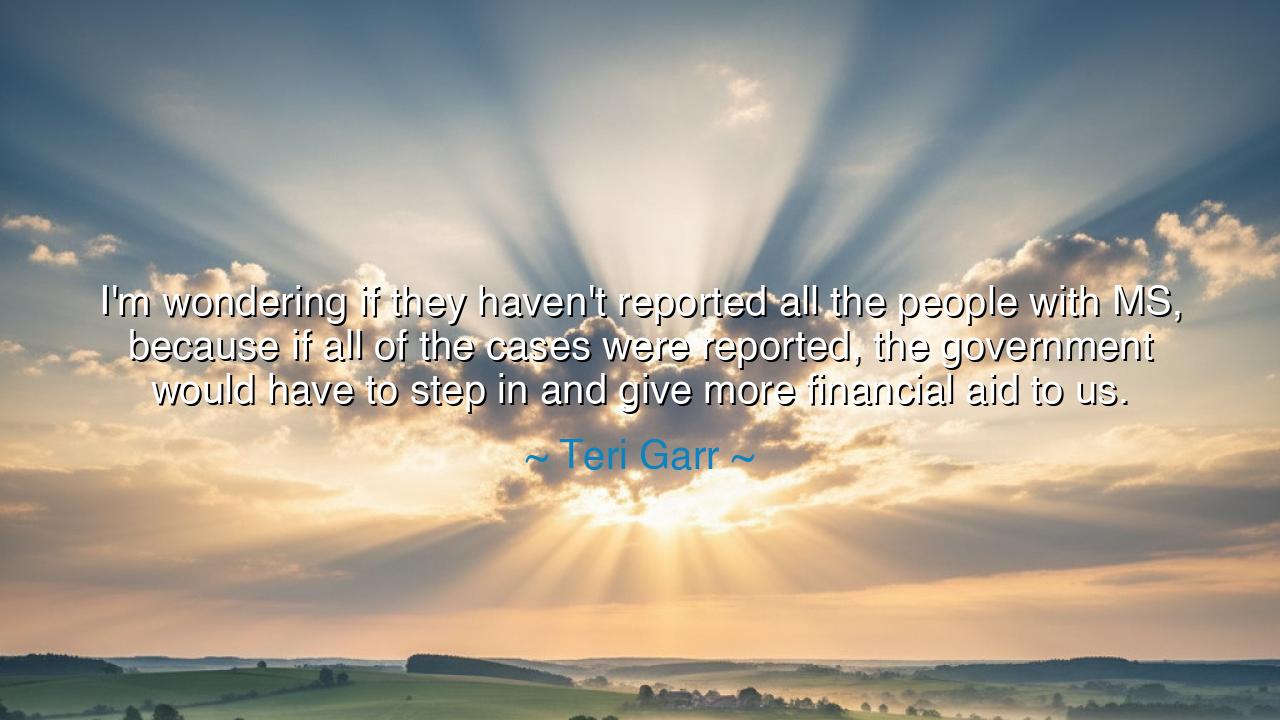
I'm wondering if they haven't reported all the people with MS
I'm wondering if they haven't reported all the people with MS, because if all of the cases were reported, the government would have to step in and give more financial aid to us.






"I'm wondering if they haven't reported all the people with MS, because if all of the cases were reported, the government would have to step in and give more financial aid to us." These words from Teri Garr raise a crucial and deeply emotional question about government responsibility, public health, and the burden of illness. Multiple Sclerosis (MS), a disease that affects the nervous system, is often misunderstood and underreported. Garr’s statement touches on the financial strain and the lack of resources that many individuals with chronic illnesses face. In this reflection, she highlights a reality faced by many: that society often fails to fully acknowledge or address the needs of those with invisible or chronic illnesses, particularly when doing so might require a significant financial investment from the state.
In the ancient world, illness and disease were often seen as divine tests, with the afflicted either receiving divine healing or suffering under divine wrath. Hippocrates, however, was one of the first to move away from seeing disease as a supernatural punishment and instead viewed illness as a natural part of human existence. His medical teachings laid the foundation for the idea that disease could be understood and managed through observation and treatment. Yet, the support system for the ill in his time was limited, and much of the responsibility for care fell on the family or the community, as no formal medical system existed to offer widespread help. This historical context speaks to the roots of modern struggles—as people with chronic illnesses today must often fight not only the disease itself but also the systemic issues that prevent them from receiving adequate care or financial aid.
The issue of government involvement in healthcare and support for the disabled or ill is as old as civilization itself. In the Roman Empire, emperors like Augustus initiated programs to help the poor and the disabled, recognizing that the well-being of the people was critical to the stability of the empire. However, despite the Roman welfare system, many still fell through the cracks, unable to access the care they needed. The poor and sick were often left to depend on the charity of others or forced into the harsh conditions of public work or service. In the same vein, Garr’s statement reveals how the modern system still often leaves the sick to struggle without adequate support, despite the recognition that healthcare systems should be responsive to the needs of all citizens.
This issue is echoed in the 19th century, when the rise of industrialization brought about massive changes in both healthcare and social welfare. The social reformers of the period, like Florence Nightingale, highlighted the need for a more systematic and compassionate approach to healthcare, particularly for the poor and marginalized. Yet, even as medical advancements flourished, the systemic neglect of certain groups persisted. In the case of MS and other chronic illnesses, the lack of visibility of such diseases often resulted in a lack of social support. Just as Nightingale fought for a more humane system for the sick, Garr’s call for better financial aid speaks to a longstanding struggle for equity in healthcare systems—a struggle that remains relevant today.
Teri Garr’s reflection on the underreporting of MS cases points directly to the disconnect between those who are afflicted by chronic illnesses and the systems that should support them. Financial aid and healthcare resources are often inadequate for those who need them the most, particularly for people with chronic and invisible illnesses like MS. This sentiment is not just a personal frustration but an indictment of a healthcare system that is often slow to respond to the needs of the public. The government, as Garr suggests, may be hesitant to fully acknowledge the scope of chronic illnesses because doing so would require an outpouring of resources—resources that are frequently diverted to other sectors, leaving the ill and disabled to face the burdens of their conditions alone.
The lesson here is one of compassion and advocacy. Teri Garr’s words remind us that the fight for equitable healthcare for all is far from over. We must demand that governments provide more than temporary or piecemeal solutions. True compassion lies in creating systems that care for those with chronic conditions, that recognize their needs, and that allocate resources to ensure that no one is left behind simply because their illness is less visible. Social systems must be rooted in the belief that human dignity is not determined by the severity of one’s illness, but by the basic right to care and support.
In our own lives, we must advocate for those who suffer from chronic illnesses. Whether through policy change, fundraising, or simply raising awareness, we can all play a role in ensuring that people like Teri Garr—who speak out for the financial aid that those with chronic illnesses deserve—are heard. Just as ancient cultures recognized the value of human life and the need for compassionate care, so must we ensure that no one, regardless of their illness, is forced to suffer in silence. Let us take action, not just as individuals, but as a society, to create a world where healthcare is not a luxury for the few but a right for all.






AAdministratorAdministrator
Welcome, honored guests. Please leave a comment, we will respond soon